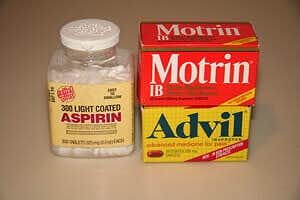
Pain relievers like ibuprofen, indomethacin, meloxicam, naproxen and piroxicam have been popular for decades. Tens of millions of people take these non steroidal anti-inflammatory drugs (NSAIDs) daily to ease sore joints and relieve a variety of aches and pains. This reader wants to know if there is a connection between ibuprofen and heart attack.
Q. I have just read about a study that shows pain relievers can lead to heart attacks. It said that the ones they tested all have the same risk. At what dose do complications kick in?
I take an ibuprofen (200 mg) almost every day to ease back and hip pain. Sometimes I take an additional dose. In addition, I take a 325 mg aspirin for my heart. Am I asking for heart trouble at these doses?
A. The PRECISION trial you read about showed that celecoxib (Celebrex), ibuprofen and naproxen all posed about the same risk of heart attacks (New England Journal of Medicine, online Nov. 13, 2016). This has been interpreted as good news by those who funded and supervised the study.
That’s because some experts feared that celecoxib might have fared far worse than traditional NSAIDs like ibuprofen and naproxen when it came to heart attacks and strokes.
The COX-2 Calamity:
Do you remember the Vioxx (rofecoxib) debacle? Before Vioxx and its cousin Bextra (valdecoxib) flamed out, there was great hope for COX-2 inhibitors. NSAIDs like diclofenac, ibuprofen, meloxicam and naproxen are not very selective in how they work. They block two enzymes, COX-1 and COX-2, that produce prostaglandins. These are hormone-like compounds that show up when we sprain an ankle, break an arm or develop arthritis.
Prostaglandins do contribute to pain and inflammation but they also play a critical role in protecting the body from assault. For example, one prostaglandin called prostacyclin keeps the sticky part of blood called platelets from clumping together to form dangerous clots. It also dilates blood vessels. Prostaglandins also protect the stomach lining from damage.
When people take NSAIDs to calm pain they often end up developing indigestion or stomach ulcers. That’s because of reduced prostaglandin production from the COX-1 enzyme. Drug companies thought that if they could just block COX-2 they might ease pain without causing stomach upset.
Doctors were excited when researchers developed compounds to block COX-2 more selectively. By allowing COX-1 to produce protective prostaglandins, they anticipated that patients would get pain relief without GI ulceration from medicines like Bextra, Celebrex or Vioxx. The commercials for this new class of pain relievers made them seem like wonder drugs. People with arthritis were dancing, ice skating, and doing martial arts.
Unfortunately, a Vioxx study produced an unexpected outcome. The drug produced an unacceptably high rate of cardiovascular complications (New England Journal of Medicine, Nov. 23, 2000). One FDA safety officer estimated that more than 100,000 Americans might have suffered a heart attack or stroke as a result of taking the drug.
Because Celebrex was a similar drug it became suspect by association. Like Vioxx, Celebrex selectively blocked COX-2. That’s why a large study was started to see whether this COX-2 inhibitor was as dangerous as Vioxx.
How Precise was PRECISION?
This study seemed huge. It involved 24,081 arthritis patients. The subjects were divided into three groups. One third got Celebrex. Another third got ibuprofen and a third group received naproxen. Some concerns have been raised about the PRECISION study. That’s in part because so many people dropped out. By the end of the trial 16,658 had bailed. That’s 69%. When so many people pull out of a study it becomes harder to interpret the data.
That said, Celebrex did not fare worse than ibuprofen or naproxen when it came to heart attacks. But it also did not perform better. In other words, all NSAIDs are risky for the heart. Some people may be susceptible to OTC doses of ibuprofen and heart attack.
What About Low Doses?
The dose used in the trial was much higher than the one you are taking: 600 mg of ibuprofen three times a day.
Since you are taking a fraction of the amount tested, the danger is presumably much lower, but probably not zero. Another concern is that ibuprofen and naproxen can undo the anticlotting activity of aspirin. As a result, you might not be getting the expected heart benefit from the aspirin you take.
Celebrex (Celecoxib) and Aspirin:
Celecoxib, on the other hand, does not appear to interfere with aspirin. You may want to ask your doctor if it would be a better alternative than ibuprofen.
We are sending you our Guide to Alternatives for Arthritis for more information on managing ongoing joint pain. Anyone who would like a printed copy, please send $3 in check or money order with a long (no. 10) stamped (68 cents), self-addressed envelope to:
Graedons’ People’s Pharmacy, No. AA-2,
P. O. Box 52027,
Durham, NC 27717-2027
It can also be downloaded for $2 from the website: www.peoplespharmacy.com.

